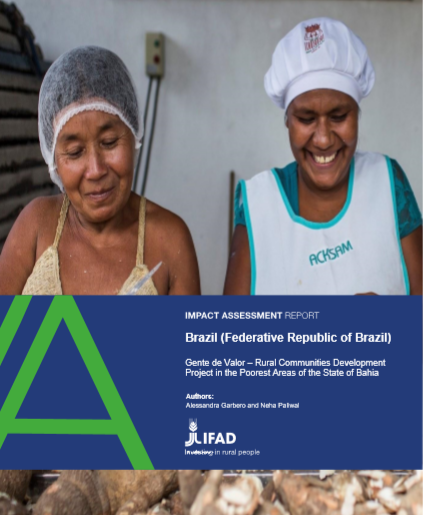Impact Assessment: Gente de Valor – Rural Communities Development Project in the Poorest Areas of the State of Bahia
Impact assessment: Gente de Valor – Rural Communities Development Project in the Poorest Areas of the State of Bahia
The Rural Communities Development in the Poorest Areas of the State of Bahia (Project Gente de Valor, GDV) was designed to strengthen the capacity of rural communities to thrive in the drought-prone environment of Brazil's north-east region through improved access to water, increased productive capacity, and empowerment of participating communities. Using a community-driven development (CDD) approach, GDV contributed to the construction of water-harvesting infrastructure, the development of low-cost backyard gardens, and the promotion of crops and production techniques suitable to the environmental conditions of the region, as well as the introduction of value addition activities.
Beneficiaries of GDV engaged in participatory planning focus groups, which helped identify interventions specific to community needs such as the construction of household and community cisterns. Production activities included agro-ecological trials to identify crops suited to thrive in the semi-arid environment and that would additionally provide opportunities for commercialization. Building off of increased access to water and technical assistance, backyard gardens were constructed to increase dietary diversification. An impact assessment of GDV was conducted in 2018. The assessment used a mixed-methods approach that combined quantitative household-level and community-level surveys and a qualitative survey (focus groups discussions and key informant interviews).
Key impact estimates
The impact assessment showed positive impacts in terms of access to water infrastructure, production of staples, assets, gender empowerment indicators such as women's self-efficacy, and group membership. Results include:
Main lessons
The evidence from this impact assessment has generated a number of lessons that can inform future project design, as well as country strategies and policies:
- Because the project targeted interventions in drought-prone areas, activities should have promoted diversification to better buffer climate shocks.
- The project's holistic approach had strong productivity and production impacts, but it was not sufficient to encourage agricultural commercialization. Addressing commercialization bottlenecks should be included as a primary component of project activities.
- The CDD approach had strong social impacts, but was in need of stronger implementation capacity from the community members to ensure sustainable productive outcomes. The latter should have been an outcome of the technical training received.
